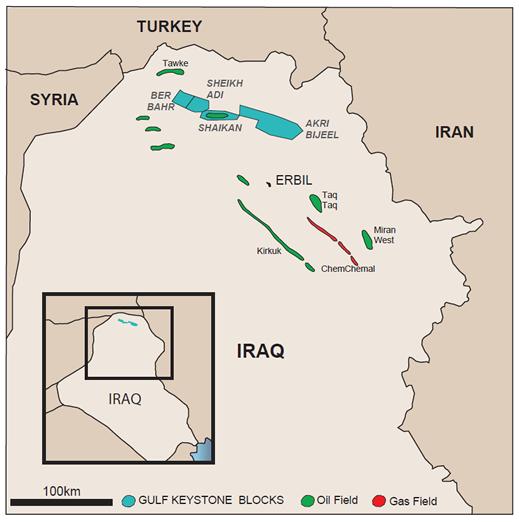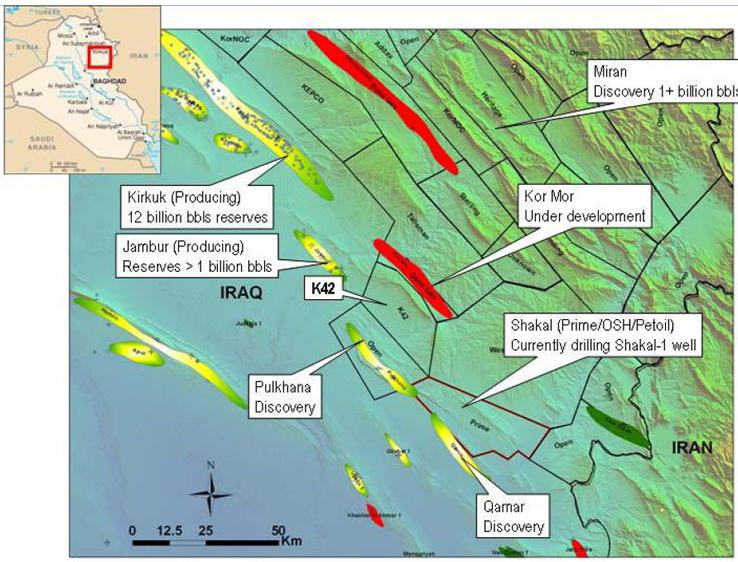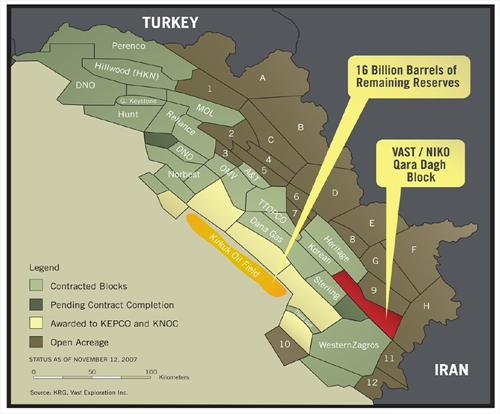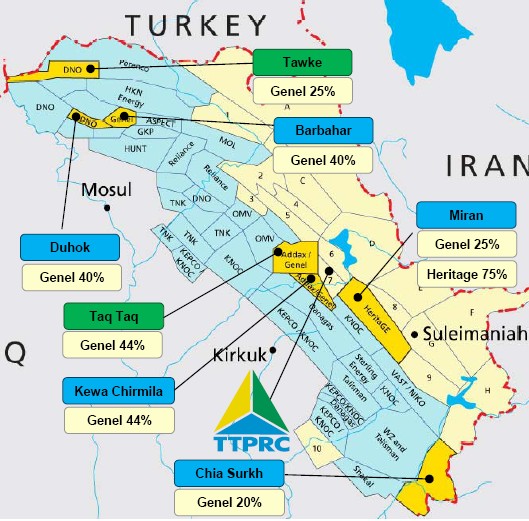The Kurdistan Regional Government (KRG) continues to award and execute contracts of the new PSAs with a consortium of companies such as Korea's National Oil Corporation, Russian TNK-BP subsidiary Norbest, India's Reliance, Austria's OMV, US Gulf Keystone International Petroleum Limited (GKPL), MOL Hungarian Oil and Gas Public Limited, Korean Hillwood International Energy Company, and US Aspect Energy, as well as renew older PSAs to Turkish Norwegian, Cayman Islands and Canadian companies.
In the interim, with the creation of the new KRG in August 2007, the Kurdish Natural Resources Minister is signing several new PSA contracts with international oil companies. A new petroleum law specifies Iraq's currently producing fields be developed by state-owned oil companies under the reconstituted INOC, while all other future fields by private companies through the contractual mechanism of production sharing agreements (PSAs), the mechanism favored by the oil companies. KRG through KEPCO received several blocks that in essence advanced plans for admitting IOCs as partners in the blocks, as KRG predicts the partners are necessary for providing technical and financial backing.
Heritage OilShares in Heritage Oil Plc (LSE: HOIL), the independent upstream exploration and production company with operation in Iraqi Kurdistan, were up more than 5% after the company issued an Interim Management Statement for the periond July 2010 to 17 November 2010.
 Gulf Keystone
Gulf Keystoneis an independent company whose focus is on exploration in the autonomous Kurdistan region of northern Iraq.
In November 2007 Gulf Keystone secured interests in two production sharing contracts in the Kurdistan Region of Northern Iraq, Shaikan and Akri-Bijeel. In 2009, the Company diversified the asset base in Kurdistan with the addition of two new Production Sharing Contracts, Sheikh Adi and Ber Bahr. This region has the potential to be a world class hydrocarbon province and Gulf Keystone believes it is well positioned to seek out further growth opportunities.
Gulf Keystone is quoted on the Alternative Investment Market (AIM) of the London Stock Exchange. Ticker symbol GKP.
Strategy
• Bring the company into production
• Explore, appraise and develop current blocks to realise reserve potential
• Regional diversification into high impact exploration / appraisal opportunities.
 Oil Search
Oil SearchOil Search has signed a Seismic Option Agreement with the Kurdistan Regional Government (KRG), over Block K42 in Iraq. The K42 Block, which covers 511 sq kms, lies in the south-eastern fairway of the Zagros Fold Belt of Kurdistan, adjacent to the Pulkhana discovery and the Kor Mor gas condensate field, which is currently under development. The K42 Block has not previously been drilled, but is thought likely to contain the highly productive Cretaceous and Tertiary intervals present in the region and therefore has the potential to contain material reserves.
Under the agreement, Oil Search will acquire 200 kms of 2D seismic. These seismic acquisition activities, which Oil Search will operate and fund 100%, are expected to commence within the next six months.
Oil Search then has an option to sign a full Production Sharing Contract (PSC) on agreed terms, should the results of the seismic data be encouraging and if other conditions precedent are met. Should the Company elect to enter a PSC, its working interest will be 60%, paying approx. 75% of the Minimum Work Programme costs (one well).
Oil Search’s Managing Director, Peter Botten, commented: 'This seismic option agreement in Block K42 provides Oil Search with an opportunity to expand its presence in a highly prolific fairway. It is in line with Oil Search’s strategy to focus on licences that have material hydrocarbon potential, as Block K42 has an excellent address in a world class hydrocarbon province. Several companies have announced large new discoveries in this highly prospective region and oil exports have recently commenced from the Tawke and Taq Taq fields. The option allows the Company to reduce subsurface risk prior to taking on drilling commitments. Knowledge gained from our past non-operated ventures in the region will be applied to Oil Search's first operated venture in Kurdistan. Oil Search is extremely pleased to be operating in Kurdistan and is looking forward to bringing both its PNG Fold Belt expertise and community affairs skills to the K42 venture.
 Vast Exploration Inc.
Vast Exploration Inc.Calgary, Alberta, - Vast Exploration Inc. (“Vast” or the “Company”) (TSX-V: VST) is pleased to announce that with its consortium partner Niko Resources Ltd. (TSX: NKO), as operator, it has entered into a Production Sharing Contract (“PSC”) with the Kurdistan Regional Government - Iraq (“KRG” or “Government”) for the exploration, development and production of petroleum resources in the 846 square kilometre Qara Dagh Block in the Sulaymaniya Governorate of the Federal Region of Kurdistan
 Longford Energy Inc.
Longford Energy Inc.Longford Energy Inc., is a junior Canadian oil and gas exploration and production company. Longford has acquired a significant interest in the Chia Surkh Block Production Sharing Contract in the Kurdistan Region – Iraq. The Block offers both a field development opportunity and multiple exploration prospects.
 Addax Petroleum
Addax Petroleum Corporation (ADXTF.PK): Addax has a 45% working interest in Taq Taq, a currently producing oil field, and another 26.67% interest in the Sangaw North PSC. Starting June 1st, 2009, Addax began exporting oil from Taq Taq, a historic event for Kurdistan.
HALLIBURTONhalliburton.gifThe decline in Iraq's oil industry and the delay of exportations is likely due to the managerial deficiencies such as the hiring of US Halliburton subsidiary Kellogg Brown & Root (KBR) without a tender to rehabilitate southern Iraq and pipelines carrying water to oilfields in southern Iraq in the Qarmat Ali Water Plant. The contract did not include the repair of the pipelines carrying the water to the oilfields, therefore the water was pumped into the ground and old pipes burst, spilling large amounts of water into the desert as well as farmers tapping the water pipes in order to irrigate fields. Then, the Army Corp of Engineers had the responsibility for rebuilding oil pumps and pipelines and they admitted they did not have oil production experience. The KRG and KBR then signed a USD 70 million contract to rehabilitate part of the pipeline system, however, KBR was only able to fulfill half of the contract, thereby preventing a couple of million barrels from being transported that had to be re-injected into the ground, a practice which is harmful to oilfields.
DNODNOCoLogo.JPG Remarkably, an oil find documented in 2005 in northern Iraq by a small Norwegian company DNO expects to use trucks with a capacity of about 15,000 barrels per day (bpd) to bring the crude to the Iraqi domestic market for refining. However, delays in passing the petroleum law as well as insurgency and crime likely have prohibited exportation of this oil. Oil companies that have signed deals with Iraq's ambitious and mostly independent northern KRG region have subsequently had conflicts with INOC in Baghdad which has caused disagreements between the northern and central regions. These conflicts are likely complicating the deals made by the KRG.
 RELIANCE LTD.
RELIANCE LTD.REL.jpgOn 8 November 2007, the KRG signed new PSAs with India's Reliance, who won two contracts for the Rovi and Sarta blocks. Reliance is investing USD 15.5-17.5 million for the two blocks that could likely hold one billion barrels of oil reserves. Under the terms of the contract, Reliance Exploration & Production, DMCC, a wholly owned subsidiary of RIL, will serve as the operator.
OMVomv.gifOn 6 November 2007, Austria's OMV was awarded with two PSAs in the Mala Omar and Shorish blocks, through its 100% subsidiary OMV Petroleum Exploration GmbH. The signed PSAs for OMV as the operator of exploration blocks with the KRG covers approximately 800 square kilometers and location is in the vicinity of Erbil, the capital of the Kurdistan Region of Iraq. Work on these blocks will likely start sometime in 2008 with the acquisition of 2D seismic technology followed by the drilling of an exploration well in each block over the next three years.
On 7 November 2007, Gulf Keystone International Petroleum Limited (GKPL) signed a PSA as operator for the Akre-Bijeel block with the KRG. The PSA is divided as GKPL 75%, Kalegran 20% and Texas Keystone 5%. Gulf Keystone will carry Texas Keystone's 5% share of initial costs and expenses prior to drilling the first well. The planned activity includes the acquisition, processing and interpretation of 100 kilometres of 2D seismic and the drilling of one exploratory well, and are in line with the terms and conditions published by the KRG. GKPL is a US (Texas) independent oil & gas exploration company, Kalegran Limited, is a subsidiary of MOL Hungarian Oil and Gas Public Limited Company (MOL). The PSA is for exploration, development and production of hydrocarbon resources in the Shaikan Block in the Dihok area of the Kurdistan Region in Northern Iraq. Location of the Shaikan Block is approximately 85 kilometers Northwest of Erbil and covers an area of 283 square kilometers.
KRG also signed five new petroleum PSAs to one NOC and four IOCs. All the deals specify 15% of profits on any commercial discoveries to the operators with the remaining to the KRG. On 10 November and 12 November, 2007, signing of the five contracts occurred during the political friction of the new petroleum law between Baghdad and the KRG, as follows:
TNK-BPTNK.jpgNorbest Limited a subsidiary of Russian TNK-BP signed for four blocks of the Hawler contract area consisting of 1,532 square kilometers in Erbil Governorate. The Hawler area comprises blocks K11, K12, K14, K15 and is considered to be low to medium exploration risk areas, likely defined as high to medium profitability area.
KOREA NATIONAL OIL CORPORATION (KNOC)KNOC.jpgKorea National Oil Corporation (KNOC) signed the Bazian block consisting of 473 square kilometers in the Sulaimani Governorate. The consortium of the Korean NOC consists of: SK Energy Company, Limited, Daesung Industrial Company, Ltd., Samchully Company, Ltd., Bum-Ah Resource Development Corporation, UI Energy corporation, GS Holdings Corporation and Majuko Corporation with the area in Iraq considered to be a low exploration risk area, likely defined an area likely to be profitable.

The other four PSAs went to Korean Hillwood International Energy Company the Sarsang block in Duhok Governorate with the area considered a medium exploration risk area; UK-based Sterling Energy the Sangaw North Block, consisting of 492 square kilometers in Saulaimani Governorate and considered a low exploration risk area; and finally Aspect Energy, LLC, described as a US-based company from Denver, CO, awarded the Atrush block considered to be a low exploration risk area.
The KRG also renewed five older PSAs to Turkey's Genel Enerji and Toronto-listed Addax Petroleum; Canadian Western Zagros; Cayman Islands Hawler Energy and A&T Petroleum; and Shakal, Trilax and Turkey's Petroleum and Petroleum Products International Exploration and Production Incorporated (PETOIL) to bring the deals in line with the Kurdish law for Norway's DNO (previously mentioned), and a service contract to government-owned Kurdistan National Oil Company (KNOC). KNOC will likely develop the Khurmala field with peak estimated output of 250,000 bpd, and build a 50,000 refinery to supply natural gas and fuel oil for power generation.
The following investments are noteworthy in terms of hydrocarbon industry's move toward integration of upstream, midstream and downstream aspects of projects and future investments:
The week of 17 December 2007, the kurdistan Regional Government and Ergil, a Turkish storage tank construction and service company, secured an oil terminal construction of Suleymania Fuel Storage Tank Project. Ergil sets up secure environments in high risk countries, and this is the first post-war oil storage terminal investment in KRG's reconstruction initiative.
Pre-production: Large International E&P Companies* Talisman Energy (TLM)
* Niko Resources (NKRSF.PK)
* OMV Aktiengesellschaft (OMVKY.PK)
* MOL Magyar Olaj-es Gazipari NyRt (MGYOY.PK)
* TNK-BP (TNBP, listed in Russia)
* Reliance Industries (500325, listed in India)
Pre-production: Junior E&P Companies
* Gulf Keystone (GKP LN or GUKYF)
* Sterling Energy (SEY LN)
* HKN Inc. (HKN)
http://seekingalpha.com/article/1452...ted-oil-fields









